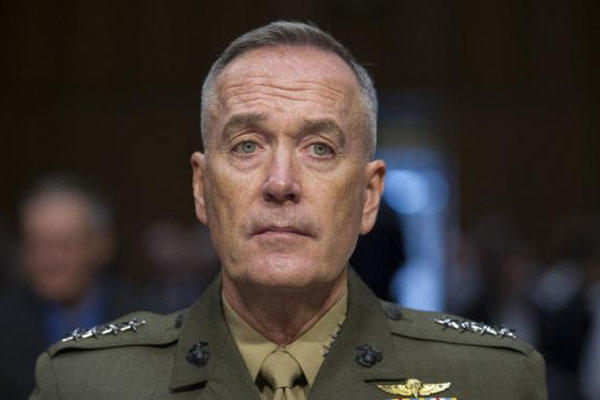Marine Gen. Joseph Dunford ranked Russia Thursday as the greatest national security challenge to the U.S., with ISIS fourth on his short list of homeland threats behind China and North Korea.
"If you want to talk about a nation that could pose an existential threat to the United States, I'd have to point to Russia," Dunford said at his Senate confirmation hearing to succeed Army Gen. Martin Dempsey as the next Joint Chiefs Chairman and top military advisor to President Obama.
"If you look at their behavior, it's nothing short of alarming," Dunford, the current Marine Commandant, said of Russian President Vladimir Putin's takeover of Crimea and backing of rebels in eastern Ukraine.
To counter Russia's "hybrid warfare," Dunford said he favored supplying weapons to Ukraine, including Javelin anti-tank missiles. "It's reasonable to provide that kind of support to the Ukrainians," he said.
Defense Secretary Ashton Carter and Dempsey are also on record in support of arming Ukraine, but NATO allies including Germany are against the proposal and President Obama has yet to give his approval.
"In my assessment, Russia presents the greatest threat to our national security," Dunford said in response to questions from Sen. Joe Manchin, D-W.Va.
"In Russia we have a nuclear power, we have one that not only has the capability to do things that are inconsistent with our national interests -- they're in the process of doing so," Dunford said.
Despite the current impasse with Russia, "it's important that we attempt to maintain a military-to-military relationship to mitigate the risk of miscalculation and begin to turn the trend in the other direction in terms of trust," Dunford said.
To the question of Sen. Mazie Hirono, D-Hawaii, on the range of threats, Dunford said: "If I had to rack 'em and stack 'em, I'd have Russia down as No. 1."
"I'd have China down as No. 2," he said.
North Korea would follow "because of their nuclear capability and then ISIL," Dunford said, using another acronym for the Islamic State of Iraq and Syria (ISIS).
Dunford said his ranking of China as the No. 2 threat was based more on China's improving military capabilities rather than an intent by Beijing to confront the U.S.
"It doesn't necessarily mean they're a current threat or that we view them as an enemy," Dunford said.
In the course of his testimony, Dunford spoke to several areas in which he might come into conflict with current administration policy in addition to arming Ukraine. However, he noted his pledge to give his best military advice to Obama.
On Iraq and Syria, he backed the current strategy of airstrikes and a limited training and advisory role on the ground in Iraq.
"I am comfortable with the current approach," he said.
However, Dunford signaled potential differences with the administration on whether Syrian rebels trained by the U.S. should be protected against airstrikes by the regime of President Bashar al-Assad.
Dunford said it was his understanding that there were legal issues barring the U.S. from acting against Assad, but "if we train moderate Syrian forces, then we ought to provide them with the wherewithal to be successful."
On Afghanistan, where he was the U.S. and NATO commander, Dunford expressed unease with the administration's plan to withdraw U.S. forces at the end of 2016 with the exception of what Sen. John McCain, R-Ariz., called an "embassy-centric" unit.
If confirmed, Dunford said one his top priorities would be to go to Afghanistan to assess the situation with Army Gen. John Campbell, the current U.S. commander, but he was inclined to prefer withdrawals to be based on conditions on the ground rather than a fixed timeline.
"I can assure you if I'm confirmed I'll provide advice to the president that will allow us to meet our current end-state goal and that'll be based on conditions on the ground," Dunford said.
On the rebalance of forces to the Pacific, Dunford strongly endorsed the overall administration policy but took issue with the proposal from Gen. Vincent Brooks, commander of U.S. Army Pacific (USARPAC), for more involvement by the Army and the placement of Army helicopters and troops on Navy ships.
"Given the shortfall of amphibious lift, I'm speaking now as a service chief, I think the priority ought to go to the U.S. Marine Corps" to avoid redundancies, Dunford said.
The 59-year-old Dunford, a product of the Boston Catholic schools and Saint Michael's University in Vermont, has 38 years of service in the Marines and would become the 19th JCS chairman and only the second Marine to hold the post.
Marine Gen. Peter Pace served for two years as JCS chairman in the administration of former President George W. Bush.
Sen. Tim Cotton, R-Ark., noted that Dunford earned the nickname "Fighting Joe" as leader of Regimental Combat Team-5 under then-Maj. Gen. James Mattis in the 2003 invasion of Iraq.
"Actually, it's not one I use," Dunford said of the nickname, but he joked that his wife occasionally calls him that. Ellen Dunford, seated directly behind the general, laughed at the reference.
-- Richard Sisk can be reached at richard.sisk@military.com





























